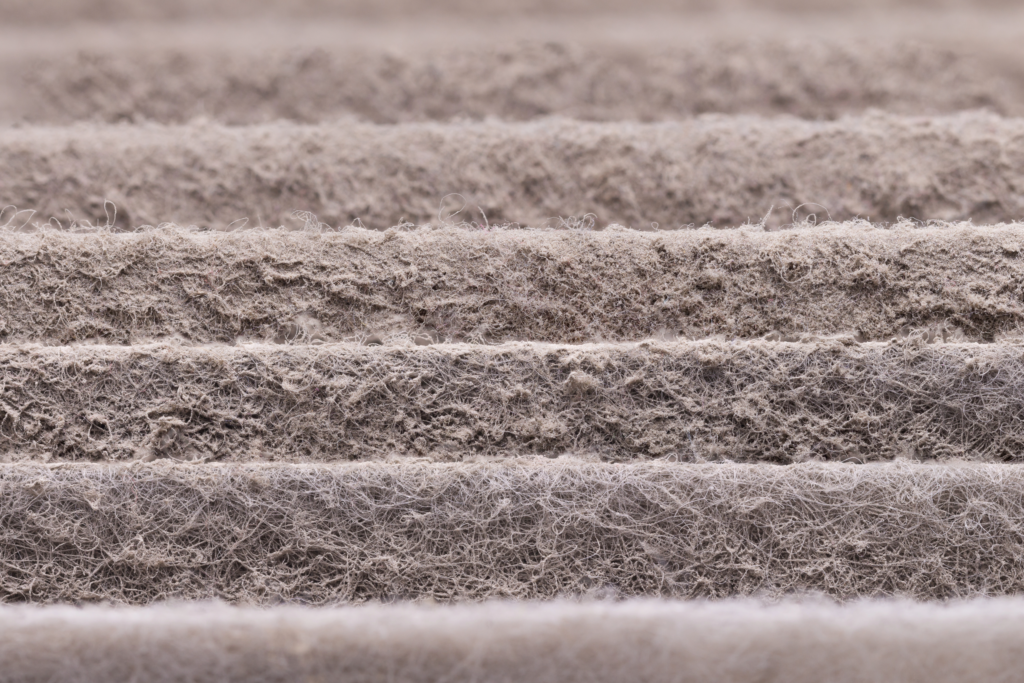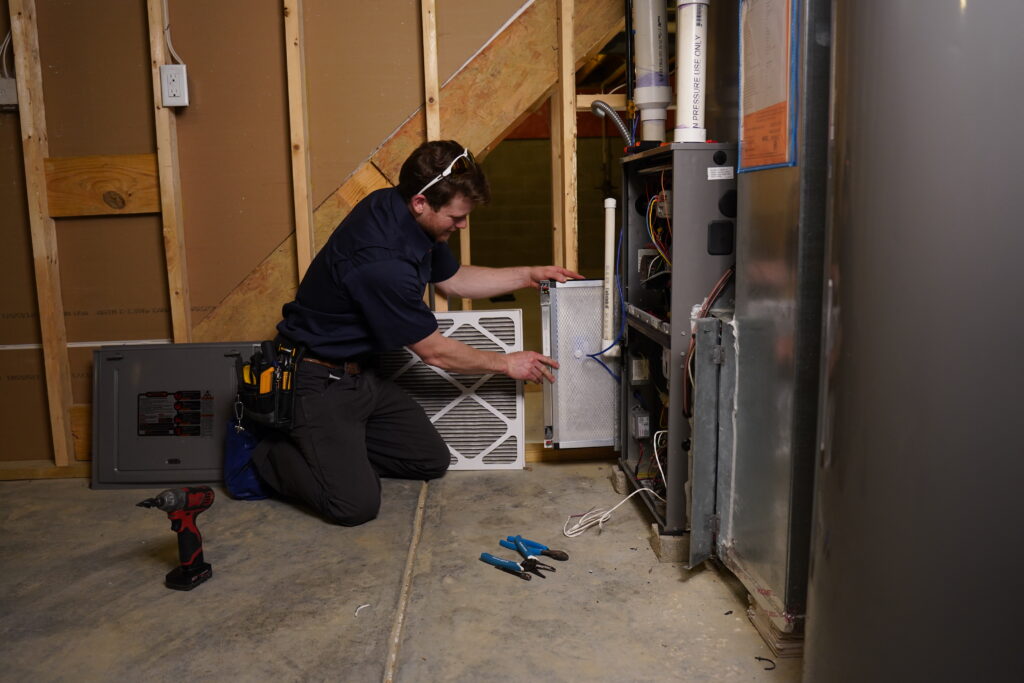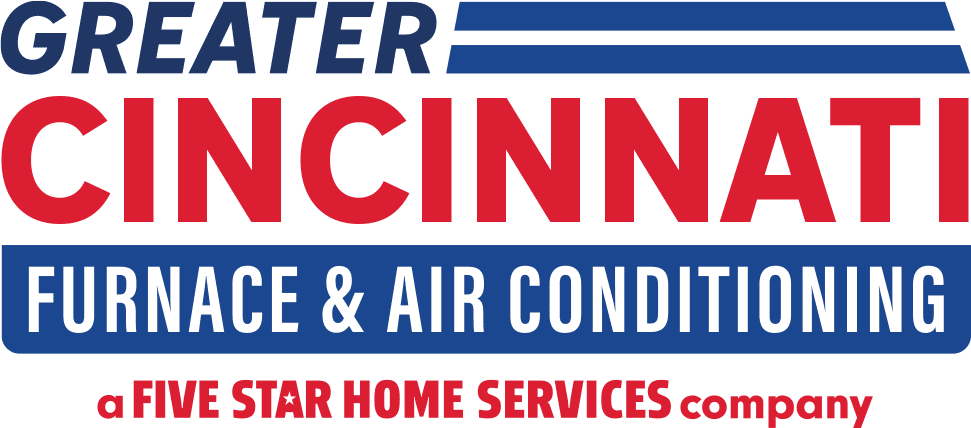It may seem like a minor issue, but a clogged air filter can significantly impact your home’s indoor air quality (IAQ) and overall health. At Greater Cincinnati Furnace & Air Conditioning, we aim to highlight the serious consequences of neglecting your air filters. Every Ohio homeowner should be aware of this crucial aspect of home maintenance to prevent potential scary HVAC-related challenges you would never want to find yourself in.

These Things are Negatively Impacted with Clogged Air Filters:
- Reduced Air Quality: A clogged air filter severely hampers your HVAC system’s ability to filter airborne contaminants, such as dust, pollen, and germs. This deterioration in indoor air quality can worsen respiratory conditions like asthma and allergies. For homeowners in Ohio, where seasonal shifts introduce various allergens, ensuring high indoor air quality (IAQ) is essential.
- Increased Energy Bills: When your HVAC system struggles to push air through a clogged filter, it consumes more energy. Research from the Department of Energy shows that replacing a dirty filter can reduce your air conditioner’s energy usage by 5% to 15%. Given Ohio’s variable weather, it’s crucial to avoid overworking your HVAC system.
- System Breakdown: Ignoring your air filter can lead to issues beyond just poor air quality and inflated energy bills. The additional strain on your HVAC system can eventually cause complete breakdowns, resulting in expensive repairs or even the need for a total system replacement. For Ohio homeowners, where HVAC systems represent a significant financial investment, consistent maintenance can save you substantial costs over time.
The Following Are Scary Consequences of Clogged Air Filters:
- Pollutants and Contaminants – A clogged air filter can lead to harmful pollutants and contaminants circulating freely in your home. These may include (but are not limited to) mold spores, pet dander, and tobacco smoke particles, which can cause a range of health issues, from minor irritations like sore throats to more severe respiratory infections. It’s crucial to address this to maintain a healthy living environment.
- Dust and Debris Build-up – An immediate consequence of a clogged air filter is the increased accumulation of dust and debris. You may notice that your furniture gathers dust more quickly, and HVAC vents can become coated with a layer of dust. This not only diminishes your home’s appearance but also means you are consistently inhaling these particles, which can impact your overall health.
- Germs and Bacteria – A less obvious but significant issue related to a clogged air filter is the growth of germs and bacteria. A dirty filter can act as a breeding ground for harmful microorganisms, which can be circulated throughout your home. This poses particular risks for individuals with preexisting asthma or respiratory conditions.
These Are the Sign You May Have Clogged Air Filters:
- Increased Allergy Symptoms: If you or your family members are experiencing heightened allergy symptoms despite medication, it’s crucial to check your air filter. Symptoms such as sneezing, coughing, and itchy eyes can be exacerbated by poor indoor air quality, indicating that your filters may require immediate attention.
- Unusual Odors: A clogged air filter can lead to unpleasant odors permeating your home. These odors can vary from musty to more pungent smells, depending on the contaminants trapped in the filter. Addressing this issue promptly can enhance your indoor environment.
- Higher Utility Bills: Have you noticed a sudden increase in your utility bills without any changes in your HVAC usage? A blocked air filter might be the reason. When the system is forced to work harder, it consumes more energy, ultimately driving up your costs.
Don’t wait for discomfort or rising bills—ensure your air filters are regularly maintained to maximize your home’s air quality and energy efficiency.
This Is How Often You Should Replace Your Air Filters:
- Seasonal Changes: In Ohio, where weather can be quite variable, it’s essential to check your air filter at the start of each season. This practice ensures your HVAC system is ready to meet the diverse demands placed on it throughout the year. Additionally, if seasonal checks aren’t your preferred method, we actually recommend that homeowners change their air filters every 30-90 days, depending on usage and lifestyle.
- After Renovations: If you’ve recently undergone home renovations, replacing your air filter is crucial. Construction projects can introduce significant dust and debris into your environment, quickly clogging your filter and affecting your air quality.
- Pet Owners: For pet owners, more frequent air filter changes are vital. Remember, pet dander and fur can accumulate in your filter much more rapidly, impacting your home’s indoor air quality.

The significance of a clean air filter in maintaining your HVAC system and ensuring optimal indoor air quality cannot be overstated. For homeowners in Ohio, where seasonal changes can significantly impact air quality, regular maintenance is crucial. By recognizing the signs of a clogged air filter and knowing how to replace it, you can effectively maintain a comfortable home environment and promote your family’s health.
Don’t delay! Incorporate air filter maintenance into your routine home care practices. With these straightforward tips, you’ll be well-prepared to tackle any air filter issues that arise, ensuring your HVAC system operates at its best. If you need further assistance, don’t hesitate to reach out—our team is here to support all your HVAC needs.
Greater Cincinnati Furnace & Air Conditioning can help you tackle any HVAC scares that come your way! Call anytime at (513) 216-4973, or schedule an appointment now by clicking here!




